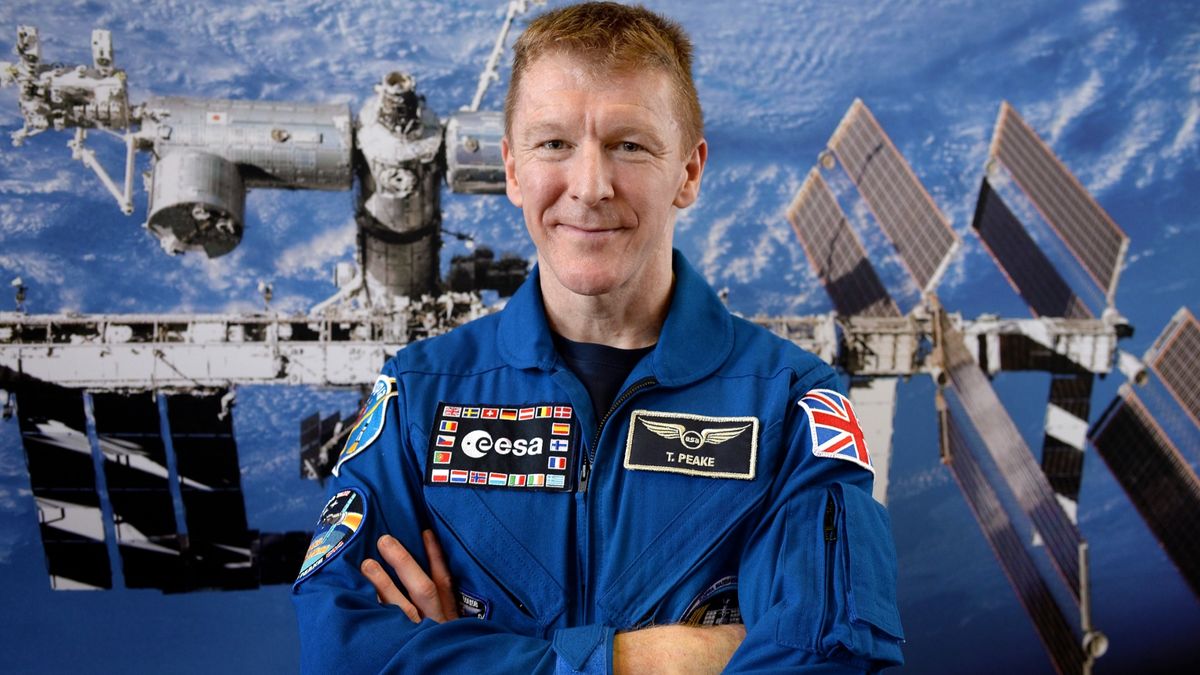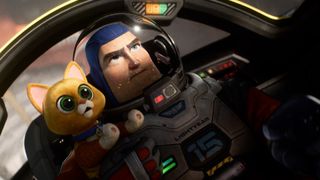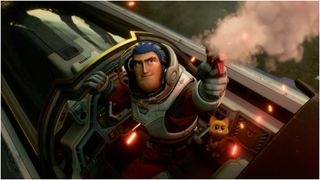Astronaut Tim Peake talks his Lightyear cameo, exploding toilets in space, and aliens
Exclusive: We chat to astronaut Tim Peake all about Lightyear, sci-fi movies… and aliens

Lightyear might be all about the fictional adventures of Buzz, but the film actually features the voice talent of a very real spaceman – British astronaut Tim Peake. Peake voices the aptly named Tim in the movie, who speaks to Buzz from Mission Control.
If you're wondering about Peake's galactic credentials, he spent six months on the International Space Station (ISS) from December 2015 to June 2016, which works out as orbiting the Earth around 3,000 times. If that wasn't cool enough, he ran the London Marathon from a treadmill aboard the ISS – becoming the second person to run a marathon from space – and is the first British astronaut to ever undertake a spacewalk. With Lightyear, he's joined the Disney Pixar universe.
Total Film sat down with Peake to talk all things Lightyear, what sci-fi movies often get wrong about space, and, of course, if he thinks aliens exist. Here's our conversation, edited for length and clarity.
Total Film: You have a voice cameo in Lightyear. Can you talk me through how that came about and how you were approached for this part?
Tim Peake: Well, it came about through a phone call from Disney, you know, 'Would you like to be involved?' And it was a very, very easy decision making process. Who wouldn't want to be involved in a Disney Pixar movie? And especially one like Lightyear, when it's been so close to the career that I've been lucky enough to have as a test pilot and going on to be an astronaut. So, no, it was brilliant to get involved.
Were you a big Disney Pixar fan before?
Huge, yes. Growing up watching the early animated movies, and as a father as well, I've got a 13-year-old and a 10-year-old, so Pixar and Disney have been a huge part in our Saturday night movie nights for many, many years.
Sign up for the Total Film Newsletter
Bringing all the latest movie news, features, and reviews to your inbox
Were you a big Toy Story fan specifically? Was that a favorite of yours before this?
I've watched the Toy Story movies, and I was going through my own pilot training at the time [they were released]. And then, as a parent, my kids have all watched the Toy Stories from the beginning, because they're absolutely timeless, and I think the great thing is that you can go back and enjoy them at any stage. It's been a huge amount of fun, seeing those characters develop, and seeing Buzz Lightyear develop in them and his story go through that. So yeah, it's great to be able to do that, and for everybody to be able to enjoy these movies throughout time.
What was it like actually recording your part? Was that all done remotely, or did you go visit Pixar or anything like that?
No, it was done in the studio. We went to Shepperton Studios, so just on the outskirts of London, and met some of the Disney team there, watched a bit of the movie, got into the flow of it to see what was happening, and that was really, really good fun. And then went behind the microphone, and Angus MacLane, the director, called in from L.A. and talked about the part and we started recording. It's a very small part, but it did take just a couple of run-throughs to get the right tone of what Angus was after.
From this whole process, from beginning to end, what's been your favorite part?
I think last night [the London premiere] was really the pinnacle of it because it was seeing everything come together. Getting to meet some of the cast, getting to meet Angus and Galyn [Susman], the producer, in person was great, and getting to meet more of the Disney team that I've been working with. So I think really last night was the best thing, and then watching the actual movie on the IMAX at the premiere, feeling the buzz, the energy, the excitement – fantastic.
In this film, we've got the characters encountering robots and these big vines and giant bugs, and so I want to know, what's your weirdest story from when you've been in space? Probably nothing on that level…
[Laughs] Thankfully, there were no giant bugs, spiders, or plants that went out of control. No, I think some of the weirdest experiences were things like toilets leaking. That was a pretty nasty morning on the Space Station [laughs], where [American astronaut] Scott Kelly realized that our loo had been leaking for about a week without anybody realizing behind the panel. And there was a little bit of moisture there, and he removed the panel, there was like an alien-sized globule of what was just urine and pretreat, and it was absolutely disgusting.
And then it started moving and floating. So it was way worse than being attacked by a bug. It was everybody to the rescue with towels and trying to just contain this disgusting ball, and then having to put that right and fix it. And we had another exploding loo moment that was even worse than that. So, yeah, I think aliens and bugs would be far easier to deal with than exploding toilets.

Sounds it! The filmmakers took a research trip to NASA. Was there anything in Lightyear that you spotted that you could tell was inspired by real-life, or something maybe that you might recognize?
Loads of little nuances in it, yes, in terms of the accuracy. The weightless environment was really well modeled, you really get the feeling of 'Yeah, that's how the bodies move in weightlessness,' that feeling of pushing away and floating. Just the spacesuits have always been true to when you're in a vacuum versus when you're in a pressurised environment, whether the helmets are up or down, or the suit is on fully or not. And the gravity environment. The attention to detail was spot on.
And then you've got the comedic element of space food, for example, being completely dull and boring, [laughs] this horrible slab of meat that's fuel that Buzz is eating. And the Sox character, Sox is the emotional robot. Well, that's something that we do have on board the Space Station, an artificial intelligence robot up there that is helping us called C.I.M.O.N., not Sox, but it was brilliant to see.
I was going to say I bet you wish you had your own Sox, but you actually do have one!
Well, Sox is way cooler. I don't think C.I.M.O.N. has a dart that puts us to sleep, although maybe it does, maybe they just haven't told us. [Laughs] But yeah, Sox is pretty cool.
From your experience, what do films set in outer space often get wrong?
Sometimes the whole weightless environment they get wrong, what you can and can't do in weightlessness. The whole floating, what it feels like to move around, the body movements. It's very hard for people to know what it's truly like in weightlessness without experiencing it. I remember watching Gravity and seeing Sandra Bullock flying around on the fire extinguisher in low Earth orbit just thinking 'No, no! [Laughs] That's wrong.' So there are these concepts sometimes that you think 'Ah, that's a bit too far-fetched.' But I go to the movies to watch them to be enjoyed, so I don't really let it wind me up too much.
That's a good way to view it. You were saying Lightyear gets the weightlessness really right – what's the most true-to-life film set in space that you've ever seen?
There have been loads. In terms of the scientific accuracy, I think Interstellar probably took on a lot of really difficult scientific concepts. You've got wormholes in there, you've got gravitational time dilation, you've got black holes and event horizons. And so that's really, really complex. Apollo 13 was wonderful in terms of its accuracy. Obviously, they were very true to the transcripts and to all of the historical documentation they had, and I think that was a brilliant movie as well. And The Martian, in terms of its scientific context. [Author] Andy Weir really wanted to make sure that the science was right in The Martian, and the movie was quite true to the book.

What are your favourite sci-fi movies? We've talked about a lot of them now, but ones that you just really enjoy?
Apollo 13 would probably have to be one of my favourite space movies. Sci-fi, I love The Abyss. I thought that was really interesting, an interesting movie, great concept. Yeah, I think that'll probably have to go down in my top five of sci-fi movies. But, of course, you've got the obvious one with 2001: A Space Odyssey, that's brilliant, too.
That's a classic. In Lightyear, we have the Space Rangers traveling to these distant planets on these fantastical missions. Do you think this kind of space exploration is the kind of thing that we'll be able to do eventually? Or is that very much a sci-fi concept?
There's the million-dollar question, isn't it? Will we ever be able to travel close to the speed of light? I don't think so, I have to say. At the moment, the speed of light is a real limiting factor. And you cannot get an object to travel close to the speed of light, it takes an enormous amount of energy and the energy required is exponential. So anything with mass, it's really, really hard to get to moving very fast. And I think that's why if you're going to travel at the speed of light, it has to be a radio signal, it has to be a photon of light or a massless particle.
So it is going to be really, really hard for us to travel, I think, beyond the solar system, just the vast distances involved. We either are going to unlock some amazing potential that we just do not know about yet that enables us to travel close to the speed of light, or we're going to have to have some sort of cryogenic system where we can go into a hibernation mode and just accept the length of time it's going to take, or a combination of both.
But flesh and blood, organic human bodies, we're quite fragile, so we don't travel well. Yeah, that's still a challenge to be overcome, I think.
And I have to ask about this… Do you think aliens exist?
Yes, they do. I'm sure they do. Will we ever make contact? That's a different question. The scale of the universe is so vast in terms of time and space, that even if you said, 'Okay, there is two or three other advanced civilizations in the Milky Way,' they could be 70, 80, 90,000 lightyears away. That's a vast, vast distance.
And also, does their time frame, does it compare to our time frame? We are just going to be around in a tiny, tiny blip of what is the universe, nearly 13.8 billion years so far, with many, many, many more billion years left to go. So there's absolutely no guarantee that our tiny, tiny time slot here in the universe is going to align with another advanced civilization. So yes, I do, I think life is everywhere in the universe, but it's a big place. Will we ever meet anyone else?
Lightyear is in theaters now. For much more on the movie, check out our interviews with the cast and filmmakers and producer Galyn Susman on reinventing Buzz's iconic catchphrase.
Fill out your watchlist with our guide to the best movies on Disney Plus – and you can catch-up on the Toy Story movies on Disney Plus, too (and read up on how Lightyear and Toy Story are connected).
If you've seen the film already, get the lowdown on the Lightyear post-credits scenes and what they mean.

I'm a Senior Entertainment Writer here at 12DOVE, covering all things film and TV for the site's Total Film and SFX sections. I previously worked on the Disney magazines team at Immediate Media, and also wrote on the CBeebies, MEGA!, and Star Wars Galaxy titles after graduating with a BA in English.
Most Popular

